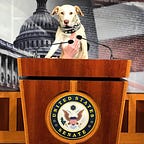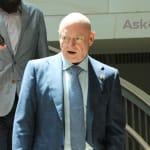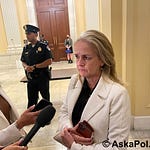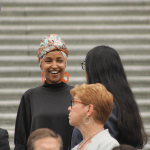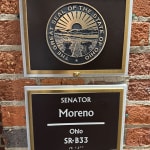Who?
US Secretary of the Interior Deb Haaland — Member, Pueblo of Laguna
LISTEN: Laslo & Haaland
Ask a Pol asks:
How important is President Biden’s apology for Indian boarding school policy?
Key Haaland:
“I didn't realize how much [this policy] affected my life — right — until I got a little bit older. And so, this is important,” Sec. Deb Haaland exclusively tells Ask a Pol. “It's, you know, her story, my mom's story, the people who we heard, the hundreds of people we heard from on our road to healing over that one year, when we traveled to so many communities, they — I hope they feel seen. I hope they feel heard by the President of the United States. And it is a big deal.”
Any meaningful steps by Biden?
How can the US federal government actually show these tribes that this is as the big deal that you're making it out to be?
“He made, for starters, made tribal consultation a top priority for his administration. And that wasn't just for the Department of the Interior, who has the Bureau of Indian Affairs and the Bureau of Indian Education. It was for his entire administration, every Cabinet member was instructed to make tribal consultation a top priority,” Haaland tells us. “The president's Investing in America agenda has moved $45 billion toward Indian country. This is like once-in-a-generation investments for renewable energy, for landscape restoration, for, you know, Indian schools, tribally-run schools. These are big investments that we have been able to make in that, you know, and this is all because of the President.”
Sheehy and his questionable comments?
GOP candidate Tim Sheehy made some questionable comments about Native Americans. Any response?
“When people say really offensive things like that, they lack a knowledge of the history of our people,” Haaland told us. “You know, our history is complicated. It's complex. It has many different eras, right? We started with contact 500 years ago when Europeans came here. We went through eras of genocide and we went through eras of land stealing and then assimilation policies. And I mean, it's just, you know, we have lived through so much.”
Below find a rough transcript of Ask a Pol’s exclusive interview with Sec. Deb Haaland, slightly edited for clarity.
TRANSCRIPT: Sec. Deb Haaland
SCENE: Ask a Pol’s Matt Laslo used to cover US Interior Sec. Deb Haaland when she was representing New Mexico in the US House of Representatives, and he’s a longtime correspondent for National Native News.

Deb Haaland: “Hello.”
Matt Laslo: “Hey, how are you, ma'am?”
DH: “I'm good, how are you doing?”
ML: “We miss you on Capitol Hill.”
DH: “Oh, thank you, you're too kind.”
ML: “But because I only have seven minutes if I ask good questions and five if I don't, I'm gonna hop right in.”
DH: “Okay.”
ML: “So how important is this? Just knowing the history of, you know, since — yeah, just knowing America's history with boarding schools. I went to a boarding school, but not one of these. How important is the president's apology?”
DH: “Oh my gosh, I am — I mean, I never thought I would see this in my lifetime, right? You know, decades ago when I was sitting at my grandmother's kitchen table and talking to her about boarding schools, you know, she wasn't — she didn't tell me everything, right? I knew there was more to what she was telling me. She was at a Catholic boarding school. It was, you know, 125 miles away from her home, but it might have been, you know, it could have been a thousand miles because her dad only had a horse and wagon, right? He couldn't visit her every day. He only in fact was — she told me he was able to only visit her twice during the five years that she was there. This — her time there, her dad's time at boarding school, that affected my life.
“that affected my life”
“And I didn't realize how much it affected my life — right — until I got a little bit older. And so, this is important. It's, you know, her story, my mom's story, the people who we heard, the hundreds of people we heard from on our road to healing over that one year, when we traveled to so many communities, they — I hope they feel seen. I hope they feel heard by the President of the United States. And it is a big deal.”
ML: “And that's the thing, talking to so many members of tribes, leaders of tribal nations, like — and apology is one thing — how is the US federal government can actually show these tribes that this is as the big deal that you're making it out to be?”
DH: “Indeed. Well, I would like to just kinda start, when the president was sworn into office, right? He made, for starters, made tribal consultation a top priority for his administration. And that wasn't just for the Department of the Interior, who has the Bureau of Indian Affairs and the Bureau of Indian Education. It was for his entire administration, every Cabinet member was instructed to make tribal consultation a top priority. So we have worked very hard in that. The president also restarted the White House Council on Native American Affairs. He restarted the Tribal Nations Summits. None of those things happened under the previous administration. So here we are, the president's Investing in America agenda has moved $45 billion toward Indian Country. This is like once-in-a-generation investments for renewable energy, for landscape restoration, for, you know, Indian schools, tribally-run schools. These are big investments that we have been able to make in that, you know, and this is all because of the President. So in a way, he has already lived up to his commitments to Indian country. And this acknowledgement and apology regarding the boarding schools, it is — it is, I mean, it's not the start of something, right? It's part of what the president has meant to do in his commitments to Indian Country.”
ML: “And I've covered the Tribal Conference since the Obama administration — and then there was that lag where they weren't there — how important has it been to rekindle those relationships and to give tribes, you know, that seat back at the table? And what do we risk losing if that goes away?”
DH: “Well, I mean, we are — you know, my hope is that tribes have solidified their — have solidified their standing, right? I want the tribes, regardless of who is in office anytime in the future, I want the Indian tribes to say, ‘we are not going back to that place, right? We are here and you're going to listen to us.’ It's, it is — you know, I started this Secretary's Tribal Advisory Committee for the first time here in this department. And we have roadmaps to how any administration can form their own tribe, you know, stack — Secretary's Tribal Advisory Committees. We have roadmaps on how the tribal nation summits are organized and done. So that I am hoping that the tribes recognize that this is their time. This is a new era for them. And I hope that they will continue to assert their place at the table.”
ML: “And now, what do you say are the state of tribal relations? Like we've heard certain politicians refer to, you know — call them drunken Indians. Like, what do you make of that?”
DH: “Well, I mean, I know that there will always be a certain amount of ignorance out there with respect to tribal nations. You know, when people say really offensive things like that, they lack a knowledge of the history of our people. You know, our history is complicated. It's complex. It has many different eras, right? We started with contact 500 years ago when Europeans came here. We went through eras of genocide and we went through eras of land stealing and then assimilation policies. And I mean, it's just, you know, we have lived through so much. And if anyone stopped to think about how we have persevered through all of those eras starting 500 years ago….
“we started with contact 500 years ago when Europeans came here”
“…not to mention the fact that ancestors like mine were building cities with millions of pounds of stone and mortar in the desert, right? I mean, we have lived through so much, and all I can say is that I hope that people who say things like that will educate themselves because that will — if they're running for office, they need to be educated so that they can be effective leaders for their constituents. That aside, I am incredibly committed myself, and I have been throughout my life to honor the legacy of my ancestors and here at the Department to honor the legacy of everyone's ancestors. That's my job and I am proud to do it. And I'm so honored to be a part of this administration, one who sees people, one who cares about every community in this country and a president who is a president for all people. It's really it's been an honor for me.”
Portions of this interview first aired on National Native News and, simultaneously, at Raw Story via The LCB — Ask a Pol founder Matt Laslo’s regionally-focused national wire service...
ML: “And here we have the President of the United States using his words, issuing an apology, you know, apologizing. And then we have other people not apologizing for certain remarks like ‘drunken Indians.’ How important is the heft of an apology from the federal government?”
DH: “Well, of course — you know, what I can say is, you know, I pretty much said it all about everything that President Biden has stood for and everything that he has done. Yes, it's going — you know, it's a very special time. It's a new era for Indian Country and our country. President Biden, if you've read any of his statements — or proclamations on Indigenous People's Day throughout this term, you will see that he values and honors everything that Indian Country has given to the United States, right? This was all Indian land at one time.
“This was all Indian land at one time” — Interior Sec. Haaland to Ask a Pol politics
“And bit by bit, you know, we — yes, our ancestors have sacrificed, but I can say that every indigenous person I know, they're proud to be American. They're proud to be a part of this country. They want to — they want to help. They want to move our country forward in every way possible. They serve in the military, they serve in the federal government, they run for office in their home states and communities. These are, you know, we have people in Indian country who are in every way working to make our country a better place. And that is completely in line with what President Biden wants to do as well. So I think it's a really awesome day and I am so proud to be a part of it.”
ML: “And now, you know, critics are going to say, the President's announcing this in Arizona, it's an election year — is this politics?”
DH: “I mean, they can say what they want. The President's apology is real. And it's heartfelt and it's meaningful and it will mean something to the people there, it will mean something to anyone who listens to it. So, I just — I am, as I said before, it's a wonderful day to be indigenous and I'm really proud to be by the President's side for this most important day.”
ML: “Have you interacted with PERC [Property and Environment Research Center] much or at all? I'm just curious about the effort to privatize federal and tribal lands.”
DH: “No, I don't know anything about that.”
ML: “Yeah? Interesting. Yeah? They just came on my radar. And then real quick...”
“Would you like to ask a different question?”
— Sec. Deb Haaland to Matt Laslo —
DH: “So I’m here at the Department of the Interior, right? We are working to manage federal lands, and I'll just say that we have, you know, we're responsible here to uphold the trust and treaty obligations of our nation's 574 federally recognized tribes. And that is a — that's a charge that we take very seriously. So treaties never expire, you know, tribes deserve a seat at the table. We're gonna do all we can to make sure that we continue to commit to that mission. And, you know, we have 90 days left in this administration and we're gonna all work as hard as we can to get as much done as we can.”
ML: “And, you know, I can't ask you about politics, but just having…”
Press handler: “Matt, I know you're gonna have to ask the question over again — but I just, this has got to be the last one just, so you know.”
ML: “But just real quick, what has Sen. Tester — as a former chairman of the Senate Indian Affairs Committee what has he meant to Indian Country?”
DH: “Would you like to ask a different question, Matt?”
Laslo laughs.
ML: “Yes, ma'am.”
DH: “Because I can't speak for him. So that's probably a question for him.”
ML: “Yep. And I'll ask it to him. I got a random one for you. Have UAPs ever come up in tribal discussions or Cabinet meetings?”
“treaties never expire”
DH: “No. I don't know what that is either.”
ML: “That's the new term for UFOs, but I figured that'd be your response.”
Press handler: “Okay, Matt. Thanks so much.”
ML: “Preciate y'all. Have a good one, Secretary.”
DH: “Bye, bye now.”
ML: “Cheers.”
Andrey Beregovskiy contributed to this article.
Content posted at AskaPol.com is copyrighted. Use our original content to move the story forward. And, please, link to us.


